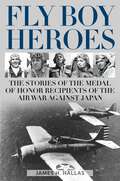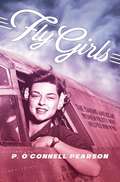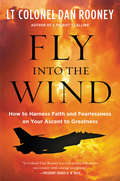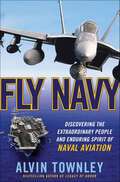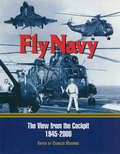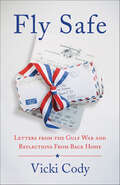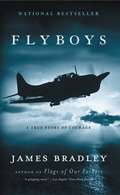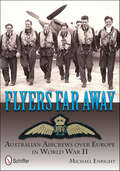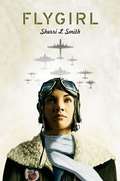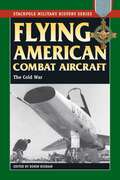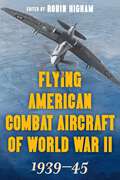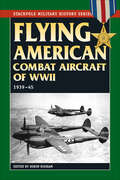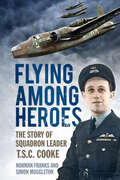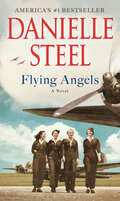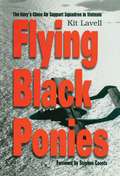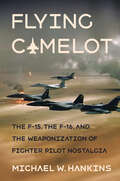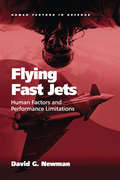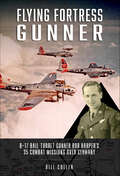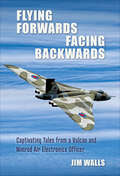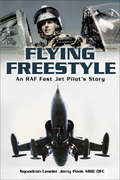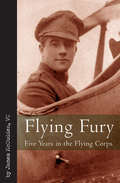- Table View
- List View
Fly Boy Heroes: The Stories of the Medal of Honor Recipients of the Air War against Japan
by James H. HallasOn the morning of December 7, 1941, Chief Aviation Ordnanceman John W. Finn, though suffering multiple wounds, continued to man his machine gun against waves of Japanese aircraft attacking the Kaneohe Bay Naval Station during the infamous Pearl Harbor raid. Just over three years later, as World War II struggled into its final months, a B-29 radioman named Red Erwin lingered near death after suffering horrific burns to save his air crew in the skies off Japan. They were the first and last of thirty U.S. Navy, Army, and Marine Corps aviation personnel awarded the Medal of Honor for their actions against the Japanese during World War II. They included pilots and crewmen manning fighters and dive bombers and flying boats and bombers. One was a general. Another was a sergeant. Some shot down large numbers of enemy aircraft in aerial combat. Others sacrificed themselves for their friends or risked everything for complete strangers.Who were these now largely forgotten men? Where did they come from? What inspired them to rise &“above and beyond&”? What, if anything, made them different? Virtually all had one thing in common: they always wanted to fly. They came from a generation that revered the aces of World War I, like Eddie Rickenbacker, the civilian flyer Charles Lindbergh, and the lost aviator Amelia Earhart—and then they blazed their own trail during World War II.
Fly Girls: The Daring American Women Pilots Who Helped Win WWII
by P. O’Connell Pearson&“A truly inspiring read.&” —Booklist (starred review) &“A solid account of women&’s contributions as aviators during World War II.&” —Kirkus Reviews In the tradition of Hidden Figures, debut author Patricia Pearson offers a beautifully written account of the remarkable but often forgotten group of female fighter pilots who answered their country&’s call in its time of need during World War II.At the height of World War II, the US Army Airforce faced a desperate need for skilled pilots—but only men were allowed in military airplanes, even if the expert pilots who were training them to fly were women. Through grit and pure determination, 1,100 of these female pilots—who had to prove their worth time and time again—were finally allowed to ferry planes from factories to bases, to tow targets for live ammunition artillery training, to test repaired planes and new equipment, and more. Though the Women Airforce Service Pilots lived on military bases, trained as military pilots, wore uniforms, marched in review, and sometimes died violently in the line of duty, they were civilian employees and received less pay than men doing the same jobs and no military benefits, not even for burials. Their story is one of patriotism, the power of positive attitudes, the love of flying, and the willingness to serve others with no concern for personal gain.
Fly Into the Wind: How to Harness Faith and Fearlessness on Your Ascent to Greatness
by Lt Colonel Rooney“Lt Colonel Dan Rooney is a true patriot who serves our country with courage and honor.”—George H.W. Bush, 41st President of the United States F-16 fighter pilot, American hero, Folds of Honor founder, PGA professional, and inspirational family man Dan Rooney delivers a motivational code for living to help ordinary people ascend to their highest level in life. <P><P>Part spiritual guide and part call-to-action, Fly Into the Wind combines Lt Colonel Rooney’s fighter pilot stories with his discovery of faith and purpose in order to help each reader achieve a philosophy he calls CAVU, after the Air Force acronym that stands for “ceiling and visibility unrestricted.” CAVU describes the perfect conditions for flying a fighter jet, when steel-blue skies invite pilots to spread their wings like supersonic eagles. In today’s world of identity politics, fractured racial relations, and external turmoil, Rooney’s book will show how all of us are connected by God in more ways than we realize, and that the path to fulfillment begins with changing ourselves in order to better one another. <P><P>From the outside, Lieutenant Colonel Dan “Noonan” Rooney was living the American Dream: he was an F-16 fighter pilot, PGA Professional, husband to his college sweetheart, and father of five daughters. His position in life should have been a blessing. But a near-tragic mishap while piloting his F-16 triggered an ominous life storm that altered his trajectory and filled him with self-doubt. Realizing that a jet takes off into the wind because it requires resistance over its wings to fly, Lt Colonel Rooney’s attitude toward the resistance he encountered in his life changed from resentment to humble introspection. Hyper-focused on the precise areas that are immediately under your control, CAVU is a disciplined approach to each day that will help you reshape, motivate, prioritize, and ultimately thrive. In Fly Into the Wind, Lt. Colonel Rooney breaks down CAVU into ten unique lines of effort (LOE), with each LOE building upon the previous one to provide a positive vector toward a new way of living. Along this enlightened path, readers will discover a renewed belief in themselves and the art of the possible. The time for self-discovery and ultimate achievement begins now.
Fly Navy: Discovering the Extraordinary People and Enduring Spirit of Naval Aviation
by Alvin TownleyTop Gun was only part of the story. Fly Navy delves beyond the Hollywood image to reveal the true mettle and genuine story of the elite men and women of naval aviation.For one hundred years, the U.S. Navy's aviators and crews have made the difference on military and peacetime missions around the world. Their unparalleled skill, preparation, and everyday dedication have paid off when it matters most: when lives are on the line. Together, these men and women—officers and enlisted personnel, past and present—have protected freedom, served their country, and forged a legacy of valor like no other. In this landmark book, Alvin Townley takes readers on an adventure around the world and across generations as he goes behind the scenes of naval aviation. From the skies over the Arabian Sea to the jungles of Southeast Asia to carriers patrolling the vast Pacific, he uncovers incredible stories of service members who survived weeks adrift at sea, made midnight rescues in deadly storms, crash-landed behind enemy lines, and found themselves in situations where their exceptional training and focus were the only things standing between life and death. Filled with inspiring personal accounts of courage, camaraderie, and sheer perseverance, Fly Navy pays tribute to the extraordinary individuals who have built naval aviation into the revered force it is today—and will remain tomorrow.
Fly Navy: The View From the Cockpit, 1945–2000
by Charles ManningThis book tells the full story of flight from sea, discussing the dangers that naturally come with this seemingly unnatural mode of airbase, including the unfortunate losses of over 900 men during this period. It covers the development of new technology of the period and how changes in other areas such as the cold war and rise of nuclear power, meant that much of the abilities had to be changed and developed.
Fly Safe: Letters from the Gulf War and Reflections From Back Home
by Vicki CodyIt is August 1990, and Iraq has just invaded Kuwait, setting off a chain reaction of events leading up to the first Gulf War. Vicki Cody’s husband, the commander of an elite Apache helicopter battalion, is deployed to Saudi Arabia—and for the next nine months they have to rely on written letters in order to stay connected.From Vicki’s narrative and journal entries, the reader gets a very realistic glimpse of what it is like for the spouses and families back home during a war, in particular what it was like at a time when most people did not own a personal computer and there was no Internet—no iPhones, no texting, no tweeting, no Facetime. Her writing also illuminates the roller coaster of stress, loneliness, sleepless nights, humor, joys, and, eventually, resilience, that make up her life while her husband is away. Meanwhile, Dick’s letters to her give the reader a front row seat to the unfolding of history, the adrenaline rush of flying helicopters in combat, his commitment to his country, and his devotion to his family back home. Together, these three components weave a clear, insightful, and intimate story of love and its power to sustain us.
Flyboys: A True Story of Courage
by James BradleyThis acclaimed bestseller brilliantly illuminates a hidden piece of World War II history as it tells the harrowing true story of nine American airmen shot down in the Pacific. One of them, George H. W. Bush, was miraculously rescued. The fate of the others--an explosive 60-year-old secret--is revealed for the first time in FLYBOYS.
Flyers Far Away: Australian Aircrews over Europe in World War II
by Michael EnrightFirst one-volume history covering Australian airmen in World War II
Flygirl
by Sherri L. SmithWhen America enters World War II, the Army creates the Women's Air Force Service Pilots (WASP). Having always dreamed of flying, Ida Mae Jones, a young African-American woman, suddenly sees a way to fly as well as do something significant to help her brother stationed in the Pacific.
Flying American Combat Aircraft (Stackpole Military History Series)
by Robin HighamRiveting accounts from the pilots who flew such planes as the F-15, B-52, C-130, and many more. Dozens of in-the-cockpit photos.
Flying American Combat Aircraft of World War II: 1939–45
Riveting, first-person accounts that put the reader in the cockpit. Dozens of photographs of the planes and the pilots that flew and fought in the skies from Tokyo to Berlin. Find out what it was like to fly some of the all-time classic aircraft of World War II, including the P-51 Mustang, B-17 Flying Fortress, P-47 Thunderbolt, P-38 Lightning, P-40 Kittyhawk, and many more!
Flying American Combat Aircraft of World War II: 1939–45 (Stackpole Military History Series)
by Robin HighamWWII fighter pilots share stories of flying into battle from Berlin to Tokyo in Mustangs, Spitfires, Flying Fortresses and more. In Flying American Combat Aircraft of World War II, U.S. Air Force veterans recount thrilling tales that put readers in the cockpit. These personal remembrances of aerial combat offer vividly detailed depictions of fighting across Europe as well as in the Pacific. The twenty-nine contributors also cover a wide range of America&’s WWII-era combat aircraft, including the B-25 Mitchell, B-29 Superfortress, P-47 Thunderbolt, P-40 Kittyhawk, B-18 bomber, and many others. Their stories are enhanced by dozens of photographs of the planes and the pilots who flew them.
Flying Among Heroes: The Story of Squadron Leader T.S.C. Cooke
by Norman Franks Simon MuggletonT.S.C. Cooke joined the RAF as war began in 1939, aged 18, and trained to be a bomber pilot. Rising to the rank of squadron leader and decorated three times, Cooke bombed Berlin on 7 October 1940 in a Whitley Mk V, nearly ditching in the North Sea. Throughout this tour he faced the usual dangers of wartime aircrew, his aircraft being hit by AA fire on several occasions, once almost having to order his aircrew to bail out but landed safely at the last minute. They were also attacked by night fighters, encountered icing and even shot up a train and bomber station at tree-top level. Flying Wellingtons and Stirlings, Cooke took part in the infamous 1,000-bomber raid on Cologne and Essen, before returning to operations flying Special Ops Halifax aircraft, dropping agents into enemy-occupied France. After a dozen missions, he was shot down but he and his navigator survived and evaded capture. Helped by the French resistance, they got into Spain and returned home via Gibraltar. Both men received the DFC for their bravery. While their story is not totally unique, their adventures and courage make this tale akin to an adventure novel.
Flying Angels: A Novel
by Danielle SteelWorld War II brings together six remarkable young flight nurses, who face the challenges of war and its many heartbreaks and victories as unsung heroes, in this inspiring novel from #1 New York Times bestselling author Danielle Steel. <P><P>Audrey Parker’s life changes forever when Pearl Harbor is attacked on December 7, 1941. Her brother, a talented young Navy pilot, had been stationed there, poised to fulfill their late father’s distinguished legacy. Fresh out of nursing school with a passion and a born gift for helping others, both Audrey and her friend Lizzie suddenly find their nation on the brink of war. <P><P>Driven to do whatever they can to serve, they enlist in the Army and embark on a new adventure as flight nurses. Risking their lives on perilous missions, they join the elite Medical Air Evacuation Transport Squadron and fly into enemy territory almost daily to rescue wounded soldiers from the battlefield. <P><P>Audrey and Lizzie make enormous sacrifices to save lives alongside an extraordinary group of nurses: Alex, who longs to make a difference in the world; Louise, a bright mind who faced racial prejudice growing up in the South; Pru, a selfless leader with a heart of gold; and Emma, whose confidence and grit push her to put everything on the line for her patients. <P><P>Even knowing they will not achieve any rank and will receive little pay for their efforts, the “Flying Angels” will give their all in the fight for freedom. They serve as bravely and tirelessly as the men they rescue on the front lines, in daring airlifts, and are eternally bound by their loyalty to one another. Danielle Steel presents a sweeping, stunning tribute to these incredibly courageous women, inspiring symbols of bravery and valor. <P><P><b>A New York Times Best Seller</b>
Flying Black Ponies
by Kit LavellThe tragic, the comic, the terrifying, the poignant are all part of the story of the Black Pony pilots who distinguished themselves in the Mekong Delta during the Vietnam War. Flying their turboprop Broncos down and dirty, low and slow, they killed more of the enemy and saved more allied lives with close-air support than all the other naval squadrons combined during the three years they saw action. Author Kit Lavell was part of this squadron of black sheep given a chance to make something of themselves flying these dangerous missions. The U.S. Navy's only land-based attack squadron, Light Attack Squadron Four (VAL-4) flew support missions for the counter insurgency forces, SEALs, and allied units in borrowed, propeller-driven OV-10s. For fixed-wing aircraft they were dangerous, unorthodox missions, a fact readers quickly come to appreciate.
Flying Camelot: The F-15, the F-16, and the Weaponization of Fighter Pilot Nostalgia (Battlegrounds: Cornell Studies in Military History)
by Michael W. HankinsFlying Camelot brings us back to the post-Vietnam era, when the US Air Force launched two new, state-of-the art fighter aircraft: the F-15 Eagle and the F-16 Fighting Falcon. It was an era when debates about aircraft superiority went public—and these were not uncontested discussions. Michael W. Hankins delves deep into the fighter pilot culture that gave rise to both designs, showing how a small but vocal group of pilots, engineers, and analysts in the Department of Defense weaponized their own culture to affect technological development and larger political change.The design and advancement of the F-15 and F-16 reflected this group's nostalgic desire to recapture the best of World War I air combat. Known as the "Fighter Mafia," and later growing into the media savvy political powerhouse "Reform Movement," it believed that American weapons systems were too complicated and expensive, and thus vulnerable. The group's leader was Colonel John Boyd, a contentious former fighter pilot heralded as a messianic figure by many in its ranks. He and his group advocated for a shift in focus from the multi-role interceptors the Air Force had designed in the early Cold War towards specialized air-to-air combat dogfighters. Their influence stretched beyond design and into larger politicized debates about US national security, debates that still resonate today. A biography of fighter pilot culture and the nostalgia that drove decision-making, Flying Camelot deftly engages both popular culture and archives to animate the movement that shook the foundations of the Pentagon and Congress.
Flying Colours (The Hornblower Saga, Book #3)
by C. S. ForesterIn Flying Colors, Captain Horatio Hornblower finds himself captured by the French and ordered executed by Napoleon Bonaparte himself. The unflappable Hornblower however plans a daring escape with the help of Lieutenant Bush and French Royalists.
Flying Fast Jets: Human Factors and Performance Limitations (Human Factors in Defence)
by David G. NewmanThis book provides a detailed general overview of the human factors and performance limitations associated with flying fast jets, integrating all the latest available research literature on the demanding operational tasks faced by such pilots and aircrews. As such, it has a strong military focus, dealing with pilots of fighter aircraft, attack aircraft and lead-in fighter trainer aircraft that are traditionally only single or dual pilot operations. The book deals not only with the issue of G force, but discusses ejection and escape/survival, disorientation, high altitude physiology, pilot training and selection, helmet-mounted equipment, situational awareness, data fusion and multi-sensor integration, human machine interface issues and advanced cockpit design. It examines the human performance issues associated with the technological advances made in fast jets, such as increased manoeuvrability, increased use of the pilot’s head as a mounting platform for sensor and weapons systems, and the complexities involved in the human-machine interface within these aircraft.
Flying Fortress Gunner: B-17 Ball Turret Gunner Bob Harper's 35 Combat Missions over Germany
by Bill CullenThe biography of Bob Harper, a B-17 ball turret gunner with the 8th Air Force who survived 35 combat missions over Germany in WWII, and was shot down twice. At 5 feet, 4 inches tall and weighing just 110 pounds, Bob Harper was below the minimum size requirements for US military service. As the demand for manpower increased, rules were bent, Harper’s deferment was retracted, and he was drafted into the Army. Harper was deployed to the European front and survived 35 combat missions as a B-17 ball turret gunner. Based at airfields in England, Bob and the 381st Bomb Group flew brutal missions over heavily defended industrial centers in Germany. Harper was shot down twice and awarded the Distinguished Flying Cross. Through his letters home, combat reports, and extensive interviews with author Bill Cullen, Harper describes his harrowing experiences on board the Flying Fortresses of the Eighth Air Force. Cullen’s interviews with Harper took place over a period of years, and it is the anecdotes from the interviews that drive the majority of the narrative. The ball turret was located underneath the aircraft and was a confined, intense, and unique environment from which to experience combat during the Second World War. Readers will find Harper, who went on to a successful business career after the war, to be an insightful, witty, and engaging storyteller.
Flying Fortress: The Illustrated Biography of the B-17s and the Men Who Flew Them
by Edward JablonskiRenowned throughout the world for its strength and destructiveness, the Flying Fortress was one of the greatest fighting airplanes of all time. In this comprehensively documented biography, Edward Jablonski tells the story of the Flying Fortress Boeing B-17, America’s legendary long-range bomber. From the B-17's near death in infancy to the emergence of its successor, the Superfortress, Flying Fortress captures the exhilarating career of the B-17 with thrilling accounts of the exploits of these planes and their pilots. In this unforgettable history, Jablonski details the Fortress’s role in the strategic and tactical issues of air war, and chronicles the B-17’s roles in famous raids including Regensburg, Marienburg, Munster, Schweinfurt, Dresden, and Berlin, along with its part in great battles, such as D-Day. Masterfully written, Flying Fortress is a classic in aviation literature with over 400 illustrations (many unpublished action photos) in addition to a section on the design of the Flying Fortress, which includes a number of detailed cutaway drawings. Approximately 60 pages from the Flying Fortress’s Piloting Manual are also featured herein. Find out why the Flying Fortress ultimately redefined the concept of war.
Flying Forwards, Facing Backwards: Captivating Tales from a Vulcan and Nimrod Air Electronics Operator
by Jim WallsSince he was a child in the 1950s watching Vampires and Meteors operating from RAF Turnhouse, Jim Walls wanted to fly aircraft, he just never envisaged that his flying career would be spent in the back seat as opposed to the front. Jim guides readers through his 40-year RAF career that started as a Boy Entrant at RAF Cosford, then as an air radar tradesman, before specializing as an air electronics operator (AEOp) in the Nimrod MR1, and later as an air electronics officer (AEO) who flew in Nimrod R1s and Vulcan B2s. With detailed insight into the world of radar, electronic countermeasures, and signals intelligence, Jim highlights the role they played in warfare for numerous operations during the Cold War as well as the Falklands campaign, First Gulf War, and Bosnian War. He also recalls the peacetime role of the Nimrod and Vulcan with stories from his time on 51, 120, and 617 Squadrons. As well as focusing on his career, Jim gives his viewpoint on matters such as Operation Black Buck and the reduced war-fighting capability of the Vulcan as it neared retirement. This fascinating book showcases the vital role that AEOs held and the importance of radar and electronic warfare in the fight against enemy forces. It is also a tribute to the much-loved Cold War icons, the Nimrod and the Vulcan. With photography throughout, mainly from the author’s personal collection, this book will appeal to Cold War enthusiasts and fans of the iconic jets of that era.
Flying Fox: Otto Fuchs: A German Aviator’s Story, 1917–1918
by Adam M. WaitUnique personal history of the Imperial German Air Service
Flying Freestyle: An RAF Fast Jet Pilot's Story
by Jerry PookA British Royal Air Force pilot recounts his 25-year career in the cockpit during the Cold War in this military memoir. During a twenty-five-year flying career in the RAF, Jerry Pook has flown Hunter Fighter/Ground Attack aircraft in the Gulf, Harriers in West Germany, the supersonic Starfighter with the Dutch Air Force, the Harrier in Belize, Central America and the Tornado bomber at the Tri-national Tornado Training Establishment where he trained German and Italian pilots and navigators. Jerry had a long relationship with the Harrier Fighter/Ground Attack vertical take-off aircraft. This he flew in West Germany at the height of the Cold War operating from Wildenrath and off-base operations with Field Wing operations based in the fields and woods of the German countryside. Jerry saw action during the Falklands War when based on HMS Hermes and flying one of the few RAF Harriers in the Ground Attack role in support of the troops fighting ashore. He then enjoyed flying the American-built Starfighter RF 104G during a three-year exchange tour with the Dutch Air Force—he describes the Starfighter as &“beautiful to fly, smooth and sophisticated, supremely fast and powerful—if you took liberties with it you knew it would kill you in an instant.&” After three years with No 1 (Fighter) Squadron and again flying the Harrier, he moved to the then new Tornado, flying in its bomber role. This he continued to fly operationally and in the instructional role for thirteen years until grounded from military flying for medical reasons.
Flying Fury: Five Years in the Royal Flying Corps (Vintage Aviation Library)
by James B. McCuddenThe day-to-day insights of a brilliantly daring World War I ace that only ends with his death at the age of 23 . . . James McCudden was an outstanding British fighter ace of World War I, whose daring exploits earned him a tremendous reputation and, ultimately, an untimely end. Here, in this unique and gripping firsthand account, he brings to life some of aviation history&’s most dramatic episodes in a memoir completed at the age of twenty-three, just days before his tragic death. During his time in France with the Royal Flying Corps from 1914 to 1918, McCudden rose from mechanic to pilot and flight commander. Following his first kill in September 1916, McCudden shot down a total of fifty-seven enemy planes, including a remarkable three in a single minute in January 1918. A dashing patrol leader, he combined courage, loyalty, and judgment, studying the habits and psychology of enemy pilots and stalking them with patience and tenacity. Written with modesty and frankness, yet acutely perceptive, Flying Fury is both a valuable insight into the world of early aviation and a powerful account of courage and survival above the mud and trenches of Flanders. Fighter ace James McCudden died in July 1918, after engine failure caused his plane to crash just four months before the end of World War I. His success as one of Britain&’s deadliest pilots earned him the Victoria Cross.
Flying Is My Life [Illustrated Edition]
by Hanna Reitsch Lawrence Roy WilsonIncludes the Aerial Warfare In Europe During World War II illustrations pack with over 200 maps, plans, and photos.Hanna Reitsch is unusual in being a feminine woman who was yet the equal of men in a dangerous male profession -- test-piloting new military aircraft. Her love of flying from childhood on, along with her superior intelligence, determination, and ability to withstand tremendous stresses, gave her the edge that allowed her to rise to the top of the aviation world.Hanna Reitsch offered her gifts to the German nation in the same way that Adolf Hitler and many others did -- with a complete giving of herself and her abilities, holding nothing back. Although she lived to 1979, she never renounced her participation with the National Socialist government or criticized Hitler, even under pressure to do so. Hanna's life story is an amazing one that sounds almost unbelievable in its drama and acts of heroism. She never married or had children; instead she occupied herself with the two burning loves of her life -- flying and the salvation of her beloved Fatherland in its time of need.
